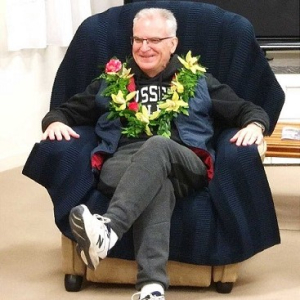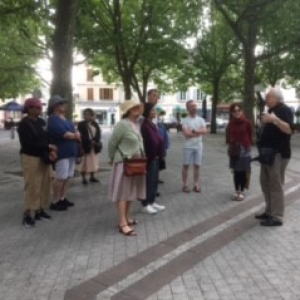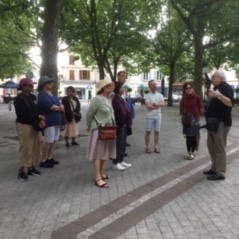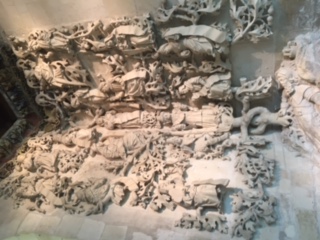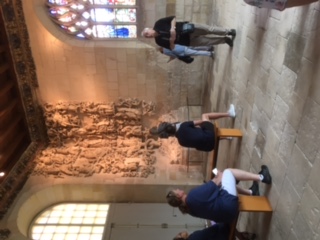Peter MALONE
Let the River Flow/ Ellos Eatnu/ La Elva Leve

LET OF THE RIVER FLOW/ ELLOS EATNU - LA ELVA LEVE
Norway, 2023, 120 minutes, Colour.
Ella Marie Haetta Isaksen, Gard Elvenes, Ivar Beddari.
Directed by Ole Glaever.
A review for this film within Norway would be quite different from a review for audiences outside the country. It does a deal with historical events, issues of rivers and dams in the late 1970s and early 1980s, government decisions about hydroelectric power and the damming of rivers (similar issues in Australia, Tasmania, in the early 1980s with the damming of the Franklin River – dramatised in the documentary film, The Giants). There are the protesters, urging non-violence, delaying government legislation, demonstrations and large numbers of police coming into disperse the demonstrators. 21st-century audiences will be more sympathetic to the protesters.
However, many Norwegians, especially the Sami people of northern Norway, will see it as a film about their cultural identity, their own language, their history, colonial attitudes by mainstream Norwegians. Reading commentaries by Sami audiences highlight how important this film is for them, even in the 21st-century, to highlight their history, their traditions, hunting and fishing, culturally and historically different from the Scandinavians. (It is worth googling Sami for explanations and background, and discovering that the Sami people prefer not to be called Laplanders.)
At the centre of the film is a young woman, Ester, Sami, trained as a teacher, her father dead, her mother marrying again, but a Norwegian with strong views, and now a half-brother who has been brought up as Norwegian rather than Sami. The young woman is Ester (Ella Maria Haetta Isaksen in her only screen role to date). She seems to have somewhat of a morose disposition, clashing with her mother, helped by her stepfather but her seeming resentful, encountering her Sami cousin who appears in traditional dress and headdress. He is heavily involved in the protests, taking Ester to the camp, her meeting the leaders, but her going to school, concealing her identity, listening to some of the taunts of the staff.
The dramatic development, in no way hurried during the two-hour length of the film, shows Esther gradually becoming more involved with the cause, understanding it, joining the protesters, appearing on television, becoming far more active, making stances like giving a Sami headdress to her half brother for Christmas to her parents’ dismay, discussions with the protest leaders, wanting to organise locals to join with the protesters on the roads, 600 police being shipped in.
Ester is a difficult personality to warm to, some admiration for the changes, but she barely smiles let alone laughs, always serious, but becoming more serious as she becomes involved in her cause.
So, a challenging film for Norwegian audiences, affirmation for Sami audiences, and a different cultural experience for non--Norwegian audiences.
1. A Norwegian film, the focus on the Sami people, identity, language, oppression?
2. The response of a Norwegian audience? Attitude towards the Sami people? Their language? Use of the Sami language, racial prejudice against the Sami? The long traditions? Dramatised in 1979-1981 here?
3. The locations, the north of Norway, the name of Lapland, the name of the Sami? Forests, lakes, rivers, homes, the range of the seasons and scenery? The school and interiors? Homes? Musical score?
4. Audiences outside Norway and the focus on the environmental issues? The dam, the lake, the river, hunting and livelihood? Issues of progress, electricity and dams? The protests and the causes? Politics, political decisions? Protests and the police, treatment?
5. Norwegian audiences, memories of the Alta river and protests? The Norwegian characters in the film, the family, politicians, pro the dam? The Sami people, protesting against the dam?
6. The focus on Ester, her background, the death of her father, her mother remarrying, a Norwegian, her half-brother, sense of alienation, the clashes with her mother during visits, the training as a teacher, going to the school, meeting with the children, their reactions? The boy who didn’t speak? Her concealing her Sami identity? The effect on her?
7. The issue of the dam, hydroelectric power, the 1970s and 80s, around the world? The Norwegian issue? The protesters, their cause, anti-violence, demonstrations, meetings, road blocking, the reaction of the police, dragging protesters away?
8. The issue of the identity, Ester concealing hers, the meeting with Mihkkal, cousin, his clothes, driving her, meeting the protesters, at school, the staff, their political stances, her reticence?
9. The film as the transformation of Ester, with Mihkkal, with the protesters, her convictions, her identity, gradually revealing it, demonstrations, on television, the consequences for her? Change, confronting her family, the Sami headdress for her half-brother, her mother’s reaction? Her stepfather her stepfather and his strong Norwegian stances? Yet kind to her? The interactions with Mihkkal, with the protesters, at school? Her organising the meeting at the church, few turning up, antagonism? Signing up Mihkkal? Going to see him, his depression, his suicide, the sadness of the funeral?
10. The buildup to the final protest, the 600 police, the night confrontation, the protesters in the Sami clothes, as to herself, dragged away?
11. At school, the reaction of the staff, Goran and his attitudes towards Ester? The young boy, going to his house, his mother, leaving Ester alone, the music?
Mission Impossible: Dead Reckoning, Part 1
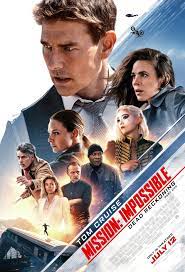
MISSION IMPOSSIBLE: DEAD RECKONING PART 1
US, 2023, 163 minutes, Colour.
Tom Cruise, Hayley Atwell, Simon Pegg, Ving Rhames, Rebecca Ferguson, Vanessa Kirby, Esai Morales, Henry Czerny, Shea Whigham, Greg Tarzan Davis, Pom Klementieff, Cary Elwes, Charles Parnell, Mark Gattis.
Directed by Christopher McQuarrie.
Action, and more action! And this is only Part One. It is all more or less as trailers and promotions lead us to expect, only more so. And then more!
At this stage of movie box office, Tom Cruise is at the top of the world. After the enormous success of Top Gun: Maverick, even 36 years after the original, here comes the next Mission Impossible saga. And we are quickly reminded that it is almost 30 years since the first film in the franchise. And, we are also reminded that a message will self-destruct after five seconds. And Tom Cruise does wear a mask and suspense fully remove it. And, all the while, especially intense during all the stunts in action, Lalo Schiffrin’s original and very familiar score for the television series.
Watching this episode of Mission Impossible, it is almost impossible not to become excited. It is amazing to see Cruise, turning 61 in the week of its release, still maintaining his success as an action star, his energetic sprinting (many times here), being seen, as so often, speeding with his motorbike, involved in fights, struggles on the top of a speeding runaway train, and the famous stunt of his riding his bike over a high cliff and parachuting down to the runaway train (which happens later in the film rather than earlier – and the film goes for 2 ¾ hours). In fact, in terms of stunts and effects, the train crash, the exploding bridge, the extended suspense of each carriage individually coming loose and dropping into the River, Cruise and Hayley Atwell trying to crawl up to safety is certainly worth waiting for.
With the espionage issues of the 1990s and the earlier films, we are now in the age of AI, AI as a potential villain, AI and its power to turn on the human race. This is demonstrated in the opening sequence, eerie, a Russian submarine, a torpedo, the enemy appearing and disappearing… And the language of the villain is The Entity. Which means that in this episode and Part 2 to be released 12 months later, there is a quest to find the keys which, literally, unlock the power of The Entity. The CIA and its unofficial agents, led by Ethan Hunt, Cruise’s character, are on the quest. (Not that you can trust all of the official American authorities.). A sinister villain from the past, Gabriel, a solid role for Esai Morales, is unscrupulous and merciless in his pursuit of the key. Vanessa Kirby is a British femme fatale who is employing agents to recover the key. And, it could all come to grief with the intrusion of a very successful thief, pickpocket, Grace, played enthusiastically by Hayley Atwell. And, into the bargain, after Ethan Hunt’s ride in the desert, the rescue of his old ally, Ilsa, Rebecca Ferguson. Not to forget Luther and Benji (Ving Rhames and Simon Pegg) with their extraordinary electronics continually communicating with Ethan. And, to cap it all off, there are two gung ho CIA agents who are determined to take down Ethan. Barely a time for pausing – and not a sign of any of them ever having a meal or having a night’s sleep!
Christopher McQuarrie has written a great number of films, Oscar for The Usual Suspects, a range of films for Cruise, Valkyrie, Jack Reacher, and three Mission Impossible films. On this evidence, he and Cruise are cinema winners.
So, plenty of plot, plot complications, chases and pursuits in the Middle East, spectacularly and smashingly through Rome, in gondolas through Venice, in and on the roof of the Orient Express through Austria…
And, by the time of the final credits, we have all decided that we really want to know what is going to happen in Part 2.
1. The popularity of the franchise? From 1996 to 2023 and beyond? In the background of the television series?
2. Tom Cruise vehicle, his success over the decades, his achievement as Ethan Hunt? Audience response to him? As a performer, his character, the stunts and action?
3. The background of the original, Lalo Schiffrin score, messages self-destruct in five seconds, the use of masks? Comments on the original, espionage of the 90s, 21st century and AI and world threats and domination?
4. The range of locations, the international sense, the US, the Arabian desert, Rome, Venice, the Austrian Alps? The musical score?
5. The prologue, the introduction of the idea of The Entity? The Russian submarine, the secret powers, the radar and the enemy, appearing and disappearing, the torpedo, destroying the Russians? The submarine and the key to The Entity and its power?
6. The US, the official meeting, Kittredge supervising, vinegar and his questions, Ethan removing his mask? The issue? The keys? The mission, beyond the bounds of the organisation?
7. Luther, Benji, from the previous films, their skills, getting on with each other, their equipment, keeping contact with Ethan, at the airport, the CIA agents pursuing, their determination, the crew changing the physical features, the issue of the bomb, the riddles and questions, the threat, the timing?
8. Gabriel, from the past, at the airport, the issue of the key, power, confronting Ethan? Going to Italy?
9. Grace, her background, British, thief, pickpocket, the keys, Ethan and the cigarette lighter? The interactions with Ethan, the issue of the key, in pockets, other pockets, skills and deception? Eluding Ethan?
10. Rome, the familiar scenes, the chases, the landmarks, the dangers, the narrow streets, crashes, Paris, sinister character, at the airport, the fights, the pursuit in the larger vehicle? Grace and her involvement, the threats?
11. Ilsa, from the past, the ride through the desert, Ethan rescuing her, her reappearing, support, her death?
12. To Venice, the White Widow, her guard, character, after the key, employment?
13. The continued chases, the CIA agents, desperate, eluding them?
14. The Orient Express, Gabriel on the train, the White Widow, the plan for Grace, the mask, impersonating, Ethan and his deal, referring her to Kittering, urging her to make a choice?
15. In the carriage, with the Widow, the mask and Grace taking her place, the clothes, the interview with Kittering, his promise, the key, her skill at pickpocketing, the transfer the money, the cancelling it? The arrival of the actual widow, the clashes? The CIA agents, Kittering trying to influence them, but his not being officially on the train? The agents relentless in continued pursuit?
16. Gabriel, the key, his interventions, brutality? Killing the drivers of the train, the runaway train?
17. Luther and Benji, Luther going underground, the equipment, Benji and the contact with Ethan, chasing the train, its not slowing down, on the bike, going up the mountain, the challenge of the fall, the high peak, the parachute, crashing into the carriage, the fight with Gabriel, on the roof of the train? With Grace, the uncoupling of the carriages?
18. The explosives on the bridge, the train, the crash, each carriage hanging, Ethan and Grace moving up the carriages, Paris and intervention, saving them?
19. The buildup of the action, the tension, the characters, Paris and the information about the submarine? Part two?
Wham!
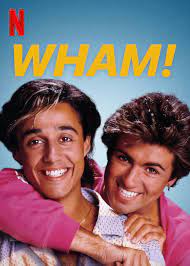
WHAM!
UK, 2023, 92 minutes, Colour.
George Michael, Andrew Ridgely.
Directed by Chris Smith.
With the release of this documentary, it was the 40th anniversary of the four-year successful career of the group, WHAM!. George Michael had a very successful career afterwards as a singer, for more than 20 years. Andrew Ridgely, on the other hand, tried his hand at various fields, including racing car driver.
The director is Chris Smith who has made documentaries on Richard Branson, life and career of Robert Downey senior and the Disappearance of Madeline McCann.
There are two principal approaches to appreciating this film which has been put together from archives and news footage, home video from the time when the two were boys at school, the early compositions, singing in clubs, moving to footage of their success, interviews both singly and together, touring the United States, the significant tour of China, and their participation in Life Aid – leading up to the decision to break up WHAM!
The first is the approach of those who were and are fans of WHAM! This audience will want to see George and Andrew, what they were like when they were young, their motivations, Andrew agreeable and supporting George, George with his Greek background, and some scenes of his proud father, their contacts, school contacts with producers, their opportunities, their initial records, the two in their early 20s. And, then there are their songs, attention given to the origins of Tropicana as well as the amusing repetition in the apologetic note about being late, the word ‘up’ twice, leading to when you go-go! This audience will be not too concerned about background details, rather enjoying the performances, the US, and, especially, their being the first pop group to travel and perform in China. And George Michael is up there with the greats, Bob Geldof, Freddie Mercury… at Live Aid.
The second approach is more sociological, reflections on the music scene in Britain from the 1970s, the influence of punk rock, the status of rock ‘n’ roll, contemporary groups (in the culmination in Live Aid). There is the social background of the two, families, school, friendships, music, the way that the two connected and stayed friends, Andrew standing back for George to have the prominence. The film also highlights the social situations in England, in London, race issues and riots of the early 1980s, the Thatcher era.
The two were fortunate to have such great success at an early age, looking at the background of the recording industry, the producers, clubs and performances, tours, the charts. It is surprising to see how quickly the two were successful, the hits, the response in the United States, the fans and crowds, memories of 20 years earlier with the Beatles. And there is the significance of the tour of China, the status of China in the mid-80s, after the Cultural Revolution, and the surprise of seeing so many Chinese fans (and their adoption of Western culture and fandom). And it was significant that the two appeared in Live Aid.
One of the key issues, especially in his personal life and career is George Michael’s sexual orientation. There are some quotations from George in the interviews, acknowledging his orientation, letting Andrew know, but the issue of keeping it from the fans. (The film does not go into George Michael’s subsequent life, relationships, arrests and charges, which the audience knows of but there is no further information.)
So, there is an exuberance in the songs and performance, amazement that WHAM!’s success was achieved before each of them reached the age of 25. And there is the interest in what they contributed to the British music scene, the world music scene in the musical culture of the 1980s.
Afterlife for Provincials
Afterlife for Provincials
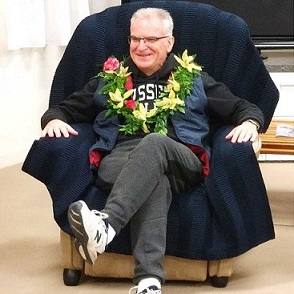
It looks like: in the first month, move to the MSC country estate, St Mary’s Towers, and be welcomed by the Douglas Park community.
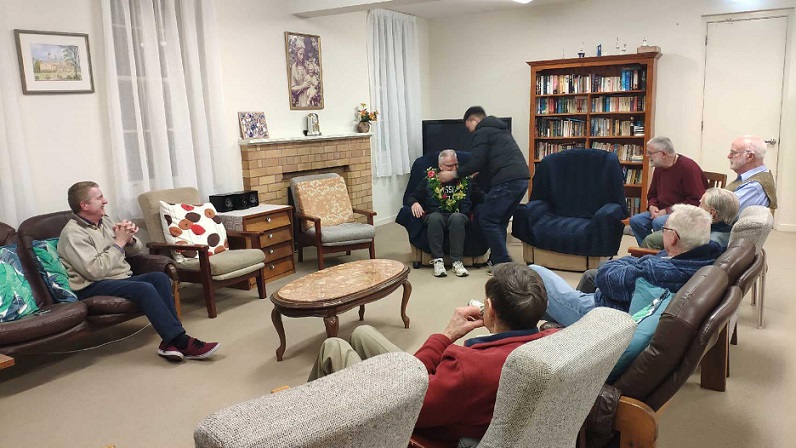
The community: Peter Harvey-Jackson, Dominic Gleeson, Chris McPhee, Josef Senjuk, Frank Dineen, Long, Paul Brennan, Len Helm, absent Tru – and, behind the camera, Nang.
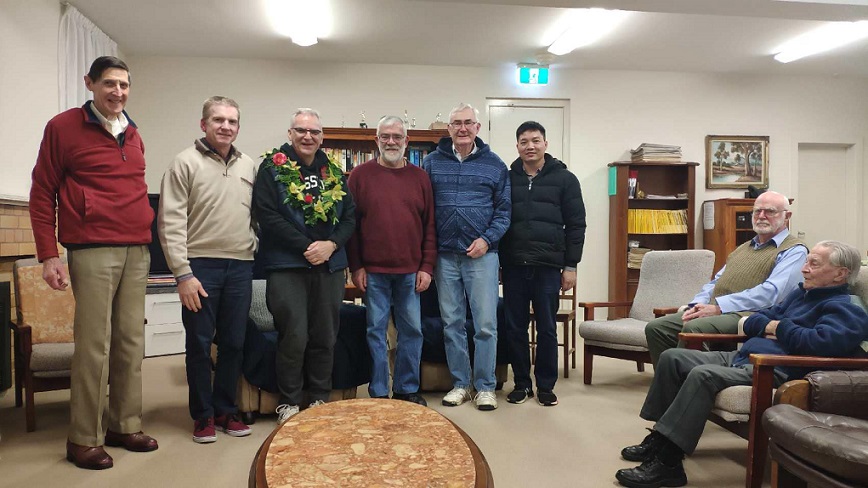
Now, Community Leader, Dominic Gleeson, is entitled juridically and MSC Constitutionally to tell Chris McPhee what to do!
RIP. Leonardo ‘Bogey’ Cabrera MSC, Philippines
RIP. Leonardo ‘Bogey’ Cabrera MSC, Philippines
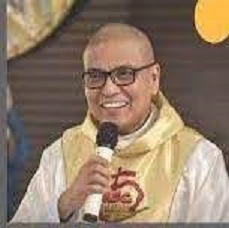
News from MSC Generalate
We sadly inform the passing of our dear confrere, our former provincial superior, Fr. Leonardo "Bogey" Cabrera, MSC. Early this morning, at around 8:17, Fr. Bogey breathed his last.
Fr. Bogey, MSC offered his life as a religious MSC on June 2, 1991, and was ordained as an MSC priest on May 16. 1997.
Fr. Bogey was a dedicated missionary and passionate leader. He had been assigned to the different ministries and missions of the congregation. He was a parish priest. He was also involved in vocation recruitment and the formation of future MSCs.
Remarkably, he was a hardworking and passionate leader. He had worked in the administrative ministries of the MSC Philippine Province. He was a provincial bursar. In the last years of his active ministries, he served as the Provincial Superior of the MSC Philippines.
His health-related battle was not unknown to us. This might have gained him strength, but this also gave us inspiration.
We thank Fr. Bogey for his selfless service to God and to His people. We pray for his eternal rest! Rest in the loving Heart of God, padre!
Salamat padre! Pray for us!

The Issoudun Pilgrimage for the Lay Staff in MSC Schools in Australia
The Issoudun Pilgrimage for the Lay Staff in MSC Schools in Australia
We posted an initial report last week. Now a follow-up.
One of the many banners that was carried in procession through Issoudun at various celebrations.
The art work ‘Tree of Jesse’ in the chapel.
The chapel of the hospital where Fr Piperron was the chaplain.
This is a wonderful opportunity to connect intimately with the Chevalier story and gain a new understanding of the charism and spirituality. The staff approach the week as pilgrims, not as tourists.
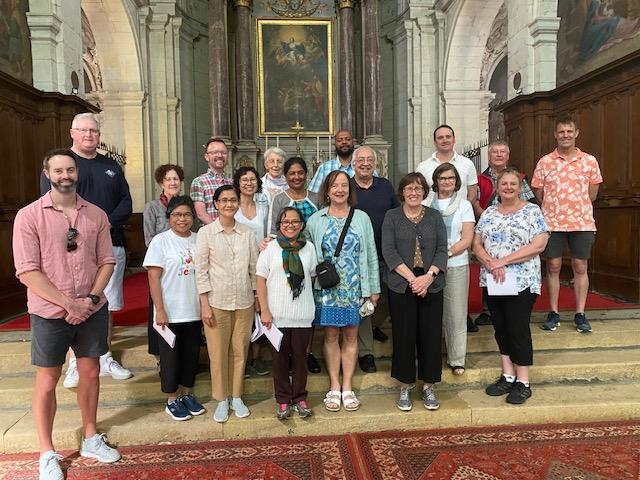
Richelieu Church
The pilgrims take the ‘outer’ journey to Issoudun and are invited to take the ‘inner’ journey. It is a journey to a sacred space. The prime reason for the lay staff to make the pilgrimage is so that they can deeply appreciate the vision and spirituality that inspires the MSC and OLSH mission in education. The deeper the appreciation the more they are able to contribute to the mission in our MSC/OLSH schools. Anne McAtomney leads the formation team including Alison McKenzie and John Mulrooney.
The group after mass in the crypt.
And time to leave

Reality

REALITY
US, 2023, 82 minutes, Colour.
Sydney Sweeney, Josh Hamilton, Marchant Davis, Benny Elledge, John Way.
Directed by Tina Satter.
Approaching this drama, about a whistleblower in 2017, a former member of the American forces, working as a linguist in the National Security Agency in Augusta, Georgia, we might think of the realities and ambiguities in the era of the Trump presidency, and realise this would be a good title, trying to come to grips with the reality of IT espionage and hacking and its exposure. And it is. However, on the very practical level, the central characters real name is Reality, Reality, Leigh Winner. And the irony of her surname, Winner, is not lost when she loses her case.
Originally a drama by Tina Satter, produced in 2019, during the Trump presidency, it is now an 82 minute film with screenplay by the director herself, but using the transcripts from the FBI interviews with Reality Winner when the have come to her house to question her. The film also uses the device of showing the text of the interviews as well as the screen monitoring the sound of the interviews. There is also another device, where aspects of the interviews are blacked out, the characters disappear momentarily from the screen. It is intriguing how this structure based on the interviews works dramatically.
Audiences watching the film may be thinking of Edward Snowden, Julian Assange, Chelsea Manning, the whistleblowers, the circulation of information, right or wrong…
Sydney Sweeney is very effective in the central role of Reality Winner, coming home with the groceries, finding the FBI, acquiescing in their interrogation and search of her house, quietly innocent, then the truth gradually revealed, her taking a document from the office, posting it to a magazine, her motivations, the issue of Russian hacking in the 2016 election, statements from the Trump administration, her reactions. While there are a few flashbacks to the office and her taking the document, most of the action is in the front yard and then in a furniture-less room in the house, making her composure and then lack of composure more credible and her admissions of what had happened. As audience, we observe, we listen, we puzzle, our sympathies are challenged, our integrity about right or wrong and whistleblowing.
While we can listen to the recordings, it is dramatically fascinating to watch the two central FBI agents, Josh Hamilton and Marchand Davis, the method they use, Marchand Davis and a certain sympathy with challenge, the main work for Josh Hamilton, laid-back, friendly, yet gradually becoming more penetrating in the questions, revealing what is known, making demands on Reality. It is also fascinating to watch the body language between the two agents, a nod of the head, an eyebrow raised, quick indications as to how to act. The other agents on the job, guards, the men searching the house, are not subtle at all.
It is on record that Reality Winner did go to jail, the irony that the information she sent to the publication for exposure was actually used on the floor of the House of Representatives soon after.
While the play was written and performed while Donald Trump was President, this film version is interesting to watch in terms of his bid for the 2024 nomination, the aftermath of the January 6th Capitol uprising, and the various charges being brought against him including, ironically, his taking of secret documents to Mar el Lago and the legal implications of this for him.
There have been several films about Julian Assange and Oliver Stone’s Snowden, with this film a helpful addition.
1. Title? The realities of espionage, international hacking, issues of treason and charges, in prison, the context of the 2016 presidential election campaign? And the fact that the central character, a whistleblower, was ironically called Reality and have the family name of Winner?
2. The screenplay based on a play, performed in 2019 during the Trump presidency? The film version released the year before the 2024 presidential campaign, the ambitions of Donald Trump, the charges against him, his enormous Republican support?
3. The screenplay based on transcripts of interviews between the FBI and Reality Winner? The visualising of the texts at times? The visualising of the soundwaves? And, at times, the blacking out of sense of material? And the disappearance of characters from the screen while these words were spoken?
4. Audience knowledge of the situation, stances towards Donald Trump, James Comey, the FBI and his rule during the presidential election, with Hillary Clinton, and his dismissal as FBI head, the presidential campaign of 2016, these events happening in the first half of the first year of Trump? The documentation about Russian hacking, interference in the election? Reality Winner and circulating the secret document, and the irony that as she went to prison, the issues were being discussed in Congress?
5. The action of the film, the suburban house in Georgia, the yard and the meeting with the agents, going into the house, so much of the action taking place in the empty room, no furniture? A touch of claustrophobic effect?
6. The nature of the performances, acting the words of the transcripts? The added advantage of performance, the FBI agents, their body language, threats, calm, encouragement, eyebrow raising, hints in movement…? And the body language of Reality, confident, the interrogations, gradually admitting the truth, worn down, nowhere to sit, the floor, a glass of water, the combination for her?
7. The effect for the audience seeing some flashbacks, Reality in the office, at work, the decision to take the document, her concealing it, the envelope, posting it?
8. Audience attitudes towards whistleblowers, the tradition of Assange, Manning, Snowden, the US government and imprisonment?
9. The portrait of Reality, just seeing her over the space of 90 minutes? The characters of the FBI agents, in charge, quiet, knowing the results but gradually eliciting the confession from Reality? The good agent-bad agent routine? The big agent and his supervision? The silent agents in their searching the house?
10. The overall effect of this experience, the personal look at Reality Winner and her attitudes, further career, her wanting to go into action, ideology, her decisions?
11. The overall effect for Americans, in the Trump era? For non-American audiences, looking on, observing, judgements?
Joy Ride/ 2023
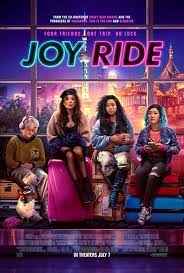
JOY RIDE
US, 2023, 95 minutes, Colour.
Ashley Park, Sherry Cola, Sabrina Wu, Stephanie Hsu, Ronnie Chieng, Desmond Chiam, Timothy Simons.
Directed by Adele Lim.
Crazy Rich Asian Women, Let Loose, Raunchy, in China. That should serve as a review – though it needs to be tripled, at least!
The Crazy Rich Asian connection is not fanciful. This film was directed by Adele Lim, a writer on the very popular Crazy Rich Asians. Someone remarked that the plot had some heart – but no brains. Sounds a little harsh, but not exactly inaccurate.
We see two young Chinese girls, one adopted by an American family, the other in the US with her Chinese family, growing up in a small town, the only two Chinese girls there, friends, one very strong, protecting the other. Then we see them as adults, though there is a lot of mutual accusation that they have not grown up, accusations not without foundation. Audrey seems to be an accomplished businesswoman. Lolo, the dominant one, works in popular art sculptures. Deadeye looks that way. And they encounter Kat, a movie star. When Audrey has to go to China for business, Lolo goes as translator, but it seems that Kat and Audrey were best friends at university.
All kinds of things go wrong in China, the friends stranded, encountering a sports team, sexual encounters, makeshift travelling all over the countryside, having to pose as a musical group… And, eventually Audrey finishes up in Korea because Lolo had found documents tracking down Audrey’s birth mother.
The film is not particularly inhibited by sex talk, sex imagery, sex jokes. Subtle it ain’t. The director has been accused of objectifying males by the female gaze. She has defended herself but it does seem a reasonable charge, given the female eye focus and attention of the camera. She has also been accused of attacking white people. An immediate response is, why not!
As might be expected after the madcap adventures, it does get a little more serious, especially concerning Audrey’s mother and quite a moving scene when she encounters a man in Korea who might have been her stepfather. While everybody does calm down, more or less, there are some reconciliations and, depending on the box office, Joy Ride 2.
Not a classy entertainment.
Acts of Violence
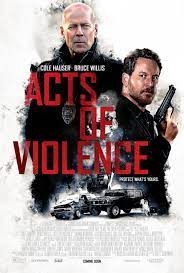
ACTS OF VIOLENCE
US, 2018, 86 minutes, Colour.
Bruce Willis, Cole Hauser, Shawn Ashmore, Ashton Holmes, Melissa Bolona, Sean Brosnan, Sophia Bush, Mike Epps.
Directed by Brett Donowho.
Act of Violence is a brief action film, the kind of film that Bruce Willis appeared in in his later years, several every year. This is one of the better films and one of his more persuasive performances even though he is, once again, a chief of police.
Initially, the film focuses on war service and its effect on military after the war, the disturbed lives. Then it moves to violence in Cleveland, thugs, gangs, the abduction of women, sex trafficking.
The focus is on a family, especially three brothers, Cole Hauser portraying the the former soldier, Shawn Ashmore the family man although he had served in the military, and Ashton Holmes as the younger brother about to be married. His fiancee, Melissa below the, on a night out with her friends, is abducted by the sex trafficking gang. The brothers go after her, violent tactics, conflict with the police, meeting Bruce Willis is a very who has been trying to track and get evidence on the trafficking leader, played by Mike Epps.
What follows is what is moral is expected but filmed with action verve, the brothers and action, the escape, but some unanticipated violence, especially at the end with Bruce Willis having up his job taking the law into his own hands.
1. The title, a violent thriller, backgrounds of war service, arms training, sex trafficking, police investigations, vigil 80 action?
2. The Cleveland setting, the military background for Declan, the domestic portrait of the family, the engaged couple, happy life? The nightclubs? The girls night out? The abduction, the imprisonment of Mia? The thugs, Max Livingstone and his organisation? The warehouses, the trucks? The police precincts? Atmospheric? The score?
3. The initial introduction to Declan, the military background, the comment on war service, the effect on the military, after war service? Disturbed?
4. The family, Brandon and his wife, his military background, more settled, family? Roman, youngest, engaged to Mia? The family gatherings, meals?
5. Mia, her friends, going to the night club, the thugs, Mia taking her stances? The abduction, her leaving a message, imprisonment with the other women, her attempts to get out, the freeing of the women? Her joining in the attack? Strong woman?
6. Roman, Brandon that is support, calling in Declan, military garb, arms? The raid on the house, their being arrested, the failure to find anyone? The contact with Avery? His getting off, his promise to find Mia, warning them off? The continuing to act, the raid, the tactics, finding the women, the rescue, Mia involved? Going to Avery, the seeming resolution?
7. Avery, a Bruce Willis character, human trafficking, Max Livingstone, looking for evidence? The encounter with the brothers, his promises, wanting them off? The arrest, the success?
8. The brothers back home, the attack on the family, Brandon shot, his wife shot? The shooting of Livingstone, the thugs killed, Livingstone getting away?
9. Avery, resigning, going up to Livingstone, shooting him? On the scene of the family reunion?
10. Another chapter in American law and frustration, vigilante films?
While at War/ Mientras dure la guerra
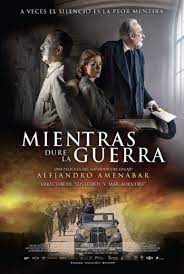
WHILE AT WAR/ MIENTRE DURE LA GUERRA
Spain, 2019, 107 minutes, Colour.
Kara Elejalde, Eduard Fernandez, Santi Prego, Nathalie Poza, Luis Bermejo, Tito Valverde.
Directed by Alejandro Amenabar.
The war from the title is the Spanish Civil War, focusing on its beginnings in 1936.
The film has as its central character, the writer, philosopher, dramatist, Miguel de Unamuno, a Nobel prize laureate nominee, a strong reputation in Spain, Dean of the University of Salamanca. He is played here by Karra Elejalde, a strong portrait of an elderly man, assertive, arrogant, dogmatic, self-confident, proud of his reputation, and proud of being able to always speak his mind. His dilemma at the outbreak of the Civil War is that he was critical of the Republic, and lost his role at the University of Salamanca, had been restored, but is now under threat from the incoming generals. Some consider that he is still on the side of the generals who want to restore the Republic, critical of socialists. The focus in this film is on his friendship with the Protestant pastor who is arrested and executed, friendship with one of his colleagues who is arrested as a socialist in and executed, the influence of his family (and some visualising of his memories with support from his wife). There is also his conflict with one of the hawkish generals, Millan Astray.
But the film also focuses on Franco, a sequence with him in Morocco and a visit from Nazi representatives, his moving back to the mainland, his shrewdness in biding his time, but his ambitions, clashes with some of the generals but eventually getting their support and becoming their Generalissimo. An interesting portrait by Santi Prego.
The other central character is Millan Astray, wounded in battle, but still hawkish, supportive of Franco, critical of Unamuno, the film showing his influence in the direction of the early part of the Civil War.
A dramatic combination of the film is a meeting of the leaders who will emerge as the fascist leaders of the war, Franco quietly present, Astray voluble and denouncing Unamuno, the Archbishop of Salamanca representing the church and Catholic traditions, and deciding in support of Franco. It is here, some months before Unamuno’s death, that he makes a famous speech (audiences interested in more information would find googling very helpful in giving background to the central characters but also to the authenticity of the speech. And Unamuno is shown as being more and more disturbed by the speeches, especially that of Astray, writing some notes on a letter he received from the Protestant pastor’s wife pleading for her husband, and then standing up and speaking. The conclusion of his speech is often quoted: "[Franco's army] is waging a campaign against liberalism, not against Bolshevism [...] They will win, but they will not convince; they will conquer, but they will not convert."
The film is an interesting look back at the Civil War after 80 years, the retrospective of Franco’s 40 year regime, fascism in Spain, the Nazi connection, neutrality and World War II, the later history of Spain in the 20th century. Audiences will be drawing on their memories of the war from the writings of Hemingway, Orwell and other prominent personalities as well is various movies starting with For Whom the Bell Tolls in 1943.
The film was written and directed by celebrated Spanish director, Leandro, neighbour, rose to prominence early in his career with Open Your Eyes (remade in the US as Vanilla Sky with Tom Cruise), The Sea Inside, The Others, Agora.
1. Audience interest in the Spanish Civil War? In Europe in the 1930s, the rise of fascism?
2. The many novels about the Civil War? The many films, remembering Ernest Hemingway, George Orwell…? The supporters of the Republic, the supporters of Franco, the supporters of the Socialist and Communist uprising?
3. This film’s focus on the beginnings of the war, especially in Salamanca, the reference to Franco in Morocco, the support of the Nazi regime? The proclamations in Salamanca? The University? The reputation of Miguel de Unamuno? His role and influence at the beginning of the conflict?
4. Salamanca, 1936, the opening in the town square and the military proclamations, the world of the University, homes, gatherings in restaurants, the increasing military presence? The scenes in Morocco with Franco? The setting up of the Centre for the generals, the meetings, the background of Catholicism, Franco’s wife and prayer, the Archbishop, the Cathedral? Recreation of the atmosphere of 1936?
5. The focus on Unamuno, his age, reputation, Basque, support of the Republic, criticisms, the overthrow, the emergence of Franco, the criticisms of Millan Astray? The flashbacks to the young Unamuno and his wife, his “habit”, her support, her death? His daughters? His grandson? His imperious manner, self-confidence, the opinionated, philosopher, the arts, his status as Dean of the University? His previous loss because of his politics? The reinstatement? The challenge to him at the outbreak of the war?
6. His friendships, the Protestant pastor and the conversations, his fellow academic, the gatherings, drinking, the response to the proclamations? The second meeting, the clash, the pastor hurt, his leaving, his being arrested, Protestant and Freemason, Unamuno visiting his wife, her concern, his promise, his interceding with the generals, the pastor’s death? His wife and her grief, coming to him for money, a letter – and his writing his famous and quoted speech on the letter? His academic friend, the past, interactions, his arrest, execution?
7. The focus on Franco, his role in the military, in Morocco, his friends and their advancing him? The portrait of the other generals, their plans, strategies, politics, the Republic, the issue of support from Germany, Franco at the meetings, his personality, his wife and daughter wanting to pray, biding his time? Building up support, the other generals, the general opposed to him, the confrontations, eventually signing the paper? Franco emerging as leader? His personality, relationship with his wife and daughter? With the other generals, with Astray?
8. Astray, forceful, hawkish, his speeches, with the troops, wanting action, disdain for Unamuno? His tactics, supporting Franco?
9. The pressure on Unamuno, resuming his role as Dean, the attitudes of his daughters, his treatment of them, his grandson? The rest and death of his friends? His previous politics, philosophy, growing disdain of fascist attitudes?
10. The final meeting, the confrontations, the various speeches, militancy, Franco, the Archbishop and his support, Unamuno rising to speak, his notes, his criticisms of the persons and their attitudes, the importance of his speech, concave and convex, fascism and communism as extremes, ‘They will win, but they will not convince; they will conquer, but they will not convert.’?
11. The aftermath, Unamuno and his health, dying soon after?
12. A retrospective on the Civil War, after 80 years? The relevance of this retrospective in view of the war itself, World War II, Franco ruling till 1975, the aftermath for Spain, and into the 21st-century?
